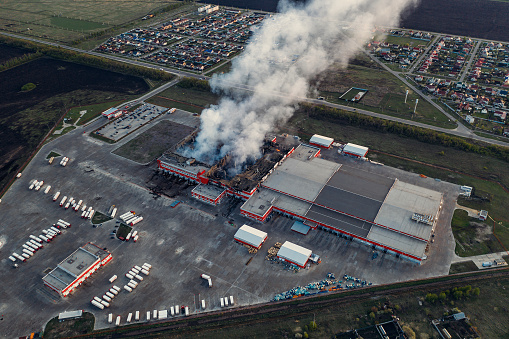How to Get the Best Fire Insurance for Your Factory
Did you know that the cost of fire insurance for a factory can be up to five times higher than for a retail outlet? That’s because factories are more susceptible to fires that cause major damage. Even small fires can trigger expensive consequences. Suppose your business is a manufacturer, wholesaler, or another company that operates in a warehouse or production building. In that case, you must understand how much fire insurance coverage you need and which additional policies can help protect your business from the fire risk. Read about fire insurance and why you need it for your factory business. We also cover the important factors to consider when comparing policy options, as well as tips on where to get the best fire insurance deal.
What is Fire Insurance for a Factory?
Fire insurance is a type of property insurance that pays you if a fire damages your property and its contents. A standard fire insurance policy will cover the cost of repairs or rebuilding and any inventory that goes unsellable due to contamination. A fire insurance policy for a factory covers the machinery, fixtures, and other items used in the manufacturing process. While fire insurance is one type of business insurance that many businesses overlook, it is one of the most important types you can have. Fire insurance is like health insurance — you hope you never need it, but if you do, you’ll be thankful you have it. Factory fires can be very expensive to clean up and repair, which is why you should get fire insurance for a factory right away.
Understanding Factory Fire Insurance
In most cases, factories face higher rates for fire insurance coverage than other types of businesses. This is because larger facilities with heavy machinery and chemicals are more susceptible to catching fire. In addition, if the building itself isn’t well-maintained, it may be deemed a high fire risk and could lead to higher premiums. Most fire insurance policies have a standard amount of coverage included in the policy fee. This amount will vary based on the type of building, the type of industry that you operate in, and the value of your inventory. Most fire insurance policies will also cover other hazards such as smoke damage, earthquakes, etc. Many policies will also cover the costs of business interruption when a fire leads to a temporary halt in your company’s operations.
Why Is Factory Fire Insurance Important?
Fire is one of the most common causes of business interruption and can quickly lead to major losses for any business. A fire can cause physical damage to a building, equipment, and inventory and negatively impact your company’s reputation. Depending on your business type, a fire could cause you to shut down for weeks or months. In the event of a fire, you will want to be prepared to deal with any associated costs as quickly as possible. This is where having fire insurance comes in. Having the right type and coverage will help you pay for any damages and get your business up and running as quickly as possible.
Types of Factory Fire Insurance
– Building insurance: This type of policy covers damage to your building, including the structure and the equipment on-site. It also covers damage caused by flooding, earthquakes, and tornadoes. – Contents insurance: This type of policy covers the loss or damage to the equipment, tools, supplies, and inventory inside your building. This type of coverage is optional for many businesses. – Business interruption insurance: This type of policy covers your operating costs during the time it takes for your business to get back up and running after a fire.
How to Find the Best Deal on Factory Fire Insurance?
Since every business is different, comparing policies from multiple providers is important. Here are a few things to consider when shopping for fire insurance: – Your industry: Certain industries are considered at higher risk for fire, such as oil and gas, chemicals, and manufacturing. If you operate in one of these industries, expect to pay higher premiums. – Your location: The geographical location of your building can also come into play when calculating your premiums. – Your policy limits: The amount of coverage you choose will affect your premiums. The higher the coverage amount, the higher the premium. – Your policy coverage: You should choose a policy that meets your business needs and covers risks that apply to your business.
Conclusion
Fire is one of the most common perils affecting businesses of all types and sizes. A fire can cause damage to your building and its contents, resulting in major losses. Fire insurance covers the cost of repairs or rebuilding a damaged building and the lost or contaminated inventory. Fire insurance coverage is an important part of any business, but especially for those in the manufacturing or chemical industries. Make sure you understand what is covered under your policy and choose a provider that offers competitive rates. With the right coverage in place, you can be rest assured that your business will be well protected in the event of a fire.




